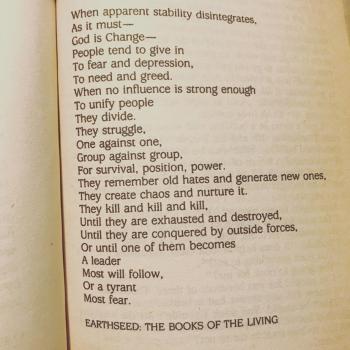 The Torchwood episode “To The Last Man” from Season 2 marks my return to watching my way through the series from the beginning. I am not sure whether this episode had a different composer score the music, but it was far more striking to me than the music has generally been in the past. It poignantly complemented the tragedy of the story and the profound question of whether acts of heroism to save humanity are worthwhile: are we worth saving?
The Torchwood episode “To The Last Man” from Season 2 marks my return to watching my way through the series from the beginning. I am not sure whether this episode had a different composer score the music, but it was far more striking to me than the music has generally been in the past. It poignantly complemented the tragedy of the story and the profound question of whether acts of heroism to save humanity are worthwhile: are we worth saving?
For those interested in religion and science fiction, the episode might not seem to have much to offer. But in fact, if one reflects on the role of Torchwood itself, it takes on characteristics and a role often attributed to a deity. Torchwood – as an organization, transcending any one individual – persists over ages of time, and thus is able to take a longer view of things. They can leave word for the future, and weave events and people in such a way as to fix a slipped stitch in the fabric of space and time. They use human beings, at times, as their pawns, and whether those individuals are recognized as heroes or deemed cowards matters little, in the grand plan which works towards a grander goal: to save humanity itself.
In exploring this possibility – that time travelers or those with access to transtemporal information could take on a godlike role and manipulate history – Torchwood explores the intersection of religion and science fiction. And in this element, as in the references to “ghosts” as people seen across the rift in time, Torchwood provides a quasi-scientific framework into which notions of providence, salvation, and spirits can be transferred and preserved.
 The show also helpfully highlights that time in the sense of temporal experience by human beings is subjective, complex, and varied. The relationship between Tommy and Tosh is experienced as four sequential days for him, and a single day in each of four calendar years for Tosh. As Tosh has reservations because she is “older” than Tommy, he points out that he was born in 1894. Two people can be the same chronological age, but very different in maturity and other aspects. Time is not only relative in the sense that Einstein clarified, but also in our subjective experience, even when neither of the two people involved is travelling closer to the speed of light than the other.
The show also helpfully highlights that time in the sense of temporal experience by human beings is subjective, complex, and varied. The relationship between Tommy and Tosh is experienced as four sequential days for him, and a single day in each of four calendar years for Tosh. As Tosh has reservations because she is “older” than Tommy, he points out that he was born in 1894. Two people can be the same chronological age, but very different in maturity and other aspects. Time is not only relative in the sense that Einstein clarified, but also in our subjective experience, even when neither of the two people involved is travelling closer to the speed of light than the other.












